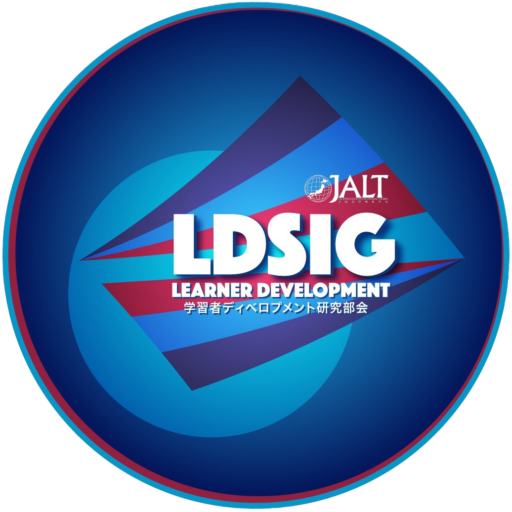LD SIG Forums 2019
The LD SIG Programme Team organized forums at the following JALT conferences in 2019:
- PanSIG 2019 – Konan University, Hyoko, May 18-19, 2019
- JALTCALL 2019 – Aoyama Gakuin University, Tokyo, May 31-June 2, 2019
- JALT2019 – WINC Aichi, Nagoya, November 1-4, 2019
Many thanks to those able to join us at the Learner Development SIG Forums in May, June, and November 2019.
(1) PanSIG 2019
Konan University, Hyogo (May 18-19)
The 2019 Learner Development SIG Forum offered a variety of research and practice-based poster-presentations. In a rotating poster presentation format, presenters and participants had a chance to share insights about fostering student growth and autonomy. Presentations this year touched upon socio-cultural communicative competence, autonomous goal setting, and student perceptions of their secondary English communication classes. In addition to having a chance to learn about and discuss these issues with presenters, the presentations will be followed by group discussions and reflection to help participants bring ideas to their own classrooms.
Presenters:
Anita Aden (Mukogawa Women’s University), Developing Communicative Competence in Socio-Cultural Settings
Ivan Lombardi and Christopher Hennessy (Fukui University), Draw out your goal: Autonomous goal-setting in an English self-directed course
Stacey Vye (Saitama University), University Students Bring Us to Their Secondary English Classrooms in Japan
(2) JALTCALL 2019
Aoyama Gakuin University, Tokyo (May 31 – June 2)
CALL & Learner Development Forum: Video sharing, recordings, quizzes, assessments, e-portfolios, and learning strategies in CALL
The Learner Development (LD) SIG Forum at JALTCALL 2019 was an interactive event featuring approaches for facilitating learner development in CALL while consulting with learners about their experiences. The aim of this forum was to critically explore the practical experiences of both learners and teachers in CALL. This LD Forum consisted of 6 presenters. In one presentation, Sina Takada presented findings from interviews with English majors regarding their own use of tablets and smartphones in their language learning. In another presentation, Blair Barr critically demonstrated how learners can use Google Forms to co-construct an extensive-listening library for classmates and future students. Also using Google Forms, Satchie Haga presented survey findings on the beliefs, attitudes, needs, and actions related to the use of mobile devices for peer assessment. In another innovative approach to teaching, Ivan Lombardi showed how students use recordings and the LMS Schoology to create ‘speaking e-portfolios’ that help the learners recognize their personal development in speaking classes. Finally, Lisa Barker and Jack Hunsberger explained how teachers can help facilitate learning through the use of presentation software and spaced repetition software. After two rounds of presentations, time was provided for reflection and discussion on key discoveries.
Presenters: Blair Barr (Tamagawa University), Student-generated video quizzing: Co-building an extensive-listening library Lisa Barker (Kyushu Sangyo University) and Jack Hunsberger III (Nakama Board of Education), Drawing Connections Between Multimodal Software and Spaced Repetition Programmes Satchie Haga (Rikkyo University), Japanese university student perceptions of using Google Forms for peer feedback Sina Tanaka (Kanda University of International Studies), Utilizing tablets and smartphones for autonomous language learning outside the classroomIvan Lombardi (University of Fukui), “Record myself is useful for aware of my progress”: A technology-enhanced routine
(3) JALT2019: “Teacher Efficacy, Learner Agency”
WINC AICHI, Nagoya (November 1-4)
Active learning as a policy for transforming lives
“Tell me and I forget. Teach me and I remember. Involve me and I learn” (Xiang, 818). Presentations in the Learner Development SIG Forum critically explored what happens to learners when participating in active learning. In addition to considering active approaches in practice, topics examined active learning in policy, online, through independent research, experience, and as a theoretical concept. Timed rounds of interactive presentations were followed by reflection and discussion on the active learning theme.
Presenters: Lorna S. Asami (Keisen University), Adding Preparation Time to Active Learning Activities for Increased Motivation and ParticipationTim Ashwell (Komazawa University), Active learning through bilingual group discussion Andy Barfield (Chuo University), Looking at active learning through the lens of student fieldworkBlair Barr (Tamagawa University & Otsuma Women’s University), Using smartphones to help create a more active learning environment Dominic G. Edsall (Ritsumeikan University & UCL Institute of Education), Visualizing Active Learning with Legitimation Code TheoryIan Hurrell (Rikkyo University), Introducing Peer-review: A principled approach Ken Ikeda (Otsuma Women’s University), Enabling students to express opinions from their core values Kio Iwai (Rikkyo University), Toward More Effective Active Learning – Analyzing Students’ Interaction in a Discussion ClassNick Kasparek (International Christian University), “Meccha active”: Deep active learning, collaborative project-based learning, and teacher education Patrick Kiernan (Meiji University), Active Learning in Large ClassesJenny Morgan (Sophia University), “Fostering active learning in compulsory EAP classes for non-English major students” Joe Sykes (Akita International University), Learners as Co-Researchers: Actively Learning about Active Learning Clair Taylor (Gifu Shotoku Gakuen University), Autonomous Active Learning Through Teletandem: One Undergraduate’s Experience Fang-Ying Yang (National Chiao Tung University), Language learner autonomy and its relation with motivation beyond the classroom
